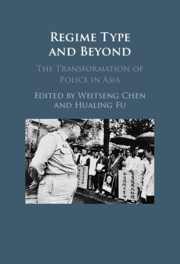Book contents
- Regime Type and Beyond
- Regime Type and Beyond
- Copyright page
- Contents
- Figures
- Tables
- Contributors
- Abbreviations
- Part I Framework
- Part II Authoritarian Policing: Past and Present
- 3 High Policing and Human Rights Lawyering in China
- 4 Transformation in Policing Minor Offending in China
- 5 From Revolutions to COVID-19
- 6 Unrestrained but Limited
- Part III Democratic Transition and Authoritarian Resilience
- Part IV The Singapore and Hong Kong Exceptions
- Part V Conclusions
- Index
5 - From Revolutions to COVID-19
Policing Narratives in Vietnam
from Part II - Authoritarian Policing: Past and Present
Published online by Cambridge University Press: 25 May 2023
- Regime Type and Beyond
- Regime Type and Beyond
- Copyright page
- Contents
- Figures
- Tables
- Contributors
- Abbreviations
- Part I Framework
- Part II Authoritarian Policing: Past and Present
- 3 High Policing and Human Rights Lawyering in China
- 4 Transformation in Policing Minor Offending in China
- 5 From Revolutions to COVID-19
- 6 Unrestrained but Limited
- Part III Democratic Transition and Authoritarian Resilience
- Part IV The Singapore and Hong Kong Exceptions
- Part V Conclusions
- Index
Summary
This chapter examines narrative management as a core function of the police in Vietnam, tracing how this function evolved as an intimate expression of the regime’s politics and ideologies. Narrative management here refers to efforts by policing institutions to guide public opinion in accordance with the vision set forth by the party-state—a practice with a long tradition in socialist regimes. While much has been written about the hard measures of coercion, crackdowns, and punishment that are prevalent in authoritarian policing (and, arguably, in all policing), less is known about the soft public relations campaigns that play a sizable role in the work of Vietnamese policing institutions. The close relationship between the party-state, police, and civil society, down to the household and individual levels, is multifaceted. As analyzed herein, while police work on ideological education is deeply rooted in a desire to control civil society, the Vietnamese police’s grassroots service throughout the COVID-19 pandemic demonstrates that a close state–society relationship can also be used for a productive end when the state acts with legitimacy and transparency.
- Type
- Chapter
- Information
- Regime Type and BeyondThe Transformation of Police in Asia, pp. 120 - 139Publisher: Cambridge University PressPrint publication year: 2023

